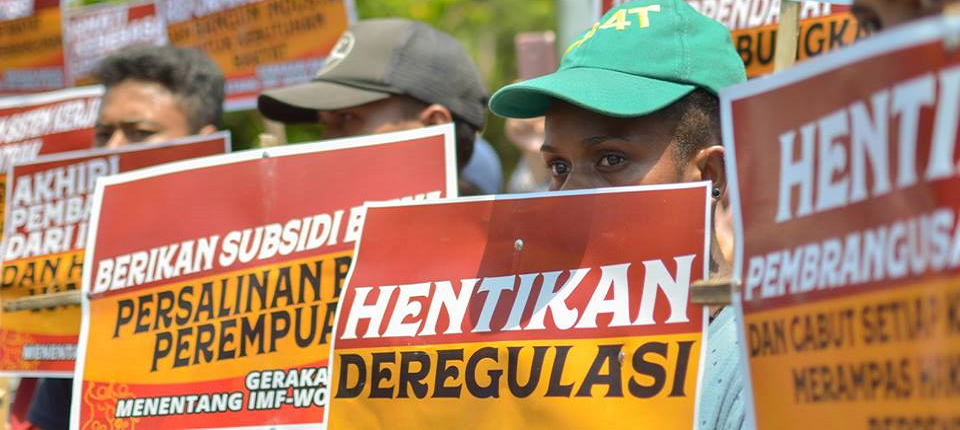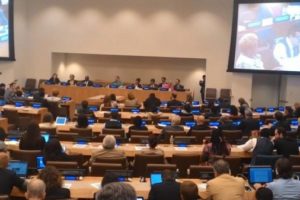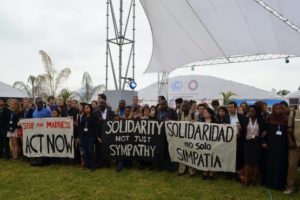[[{“type”:”media”,”view_mode”:”media_original”,”fid”:”2141″,”attributes”:{“alt”:””,”class”:”media-image”,”height”:”430″,”style”:”width: 600px; height: 269px;”,”typeof”:”foaf:Image”,”width”:”960″}}]]Photo: Peoples' Global Conference
The rhetoric around the “Maximising Finance for Development” approach frames current development issues in the South as almost exclusively a financing problem. Various considerations such as the historical outcomes of the neoliberal decades, and the need for national development strategies are shoved aside as the utmost priority of attracting private capital is given primacy.
The Hamburg Principles, which the World Bank Group cites to justify its MFD approach, were crafted in 2017. Just a year later, the orthodox view that big private sector investments necessarily contribute to “leaving no one behind” is getting increasingly questionable.
Recent data from multilateral sources reveal widening world inequalities linked to the ever bigger private sector. According to a 2018 paper published by the IMF, since the 1980s – when neoliberal policies began their heyday – and even more so since 2008, the share of revenues that went to corporations’ profits had increased throughout time while the share going to workers have declined.[i] Do we trust corporations to allow them to gain larger entry in “delivering services and infrastructure” when these entities aremain driversof today’s widening inequalities?
The strong stress on “bankable” – profitable – infrastructure projects, which could be found in the MFD approach, is also becoming more difficult to justify. The UNCTAD cites “differences in private and social returns” and the loss of policy space for a national development strategy as some problematic aspects of the current “financing gap narrative.” [ii]
The UNCTAD posits the need to begin at an “overall development strategy [that] should determine infrastructure planning…[which is] a reversal of the sequencing suggested by the financing gap approach.” The UNCTAD argues that private and social priorities are notnecessarily the same and thus the need for public actors.
Public-private partnerships are also included as one possible mode of intervention through the World Bank’s MFD approach, aside from the current large-scale promotion of PPPs to finance development projects in Southern countries. [iii] But civil society organisations (CSOs) have already pointed to the stark difference between private interests of corporations and the public interest in PPPs, with the poor and marginalised bearing the high costs while the private firms benefit. [iv]
CSOs raise transparency issues in contracts, as well as hidden financial and social costs of PPPs – from greater burdens on public funds to adverse impacts of infrastructure PPPs on communities.[v] [vi] In this light, CSOs and trade unions boycotted a World Bank consultation on PPPs earlier in 2017[vii] and oppose WB promotion of this arrangement. Against the trend towards PPPs, a counter-trend of reversing privatisation and taking back social services is said to be emerging, such as in the case of water services in Ghana, Argentina, Tanzania, Malaysia and Bolivia.[viii]
Within country membership at the IMF-WB, prospects of development felt at the grassroots are slim; the blanket promotion of what is known today as the private sector is built into the core principles of each institution. For instance, the IBRD Articles of Agreement includes “promot[ing] private foreign investment by means of guarantees or participations in loans and other investments made by private investors.”[ix]Meanwhile, the IFC Articles of Agreement cites, as one of its purposes, helping “to create conditions conducive to the flow of private capital.”[x] On these grounds, membership of Southern countries in the IMF-World Bank should be reviewed and re-examined given the impacts on people’s rights of these built-in economic and institutional assumptions.
To take this further, there is a need to assert – especially in Southern countries – that national development strategies should be owned and led by the people, especially the grassroots,and their organisations as representatives of societal sectors whose rights to land, social services and to development are at stake.The active participation of these organisations is a key premise to shape development policies that benefit the people, instead of being dominated by the neoliberal IMF-WB prescriptions, the profit-motive of international capital, and elites in government.[xi] #
[i]Diez, Federico and Daniel Leigh. 2018. “Chart of the week: The rise of the corporate giants.” IMF Blog. June 6. https://blogs.imf.org/2018/06/06/chart-of-the-week-the-rise-of-corporate-giants/
[ii]UN Conference on Trade and Development. 2018. “Trade and Development Report 2018: Power, Platforms and The Free Trade Delusion.”
[iii]IBON International. 2017. “Primer on Public-Private Partnerships.” Manila: IBON International. https://iboninternational.org/resources/17/06/22/ibon-primer-public-private-partnerships-ppps
[iv]Ibid.
[v]IBON International. 2017. “Trade unions and campaigners boycotting World Bank consultation on PPPs.” https://iboninternational.org/article/2017/02/trade-unions-and-campaigners-boycotting-world-bank-consultation-ppps
[vi]European Network on Debt and Development. 2018. “Report exposes how PPPs across the world drain the public purse, and fail to deliver in the public interest.” https://eurodad.org/history-repppeated-press
[vii]Ibid.
[viii]McDonald, David A. 2018. “Remunicipalization: The future of water services?” Geoforum 91: 47-56. https://www.sciencedirect.com/science/article/pii/S0016718518300630?via%3Dihub
[ix]The World Bank. 2012. “IBRD Articles of Agreement.” https://siteresources.worldbank.org/EXTABOUTUS/Resources/IBRDArticlesOfAgreement_links.pdf
[x]International Finance Corporation. 2012. “IFC Articles of Agreement.” https://www.ifc.org/wps/wcm/connect/corp_ext_content/ifc_external_corporate_site/about+ifc_new/ifc+governance/articles/about+ifc+-+ifc+articles+of+agreement+-+article+i
[xi]Padilla, Amy. 2018. “A decade since the 2008 crash: Protracted crisis looms with Southern debt, slowing growth.” MR Online. https://mronline.org/2018/09/25/a-decade-since-the-2008-crash/




